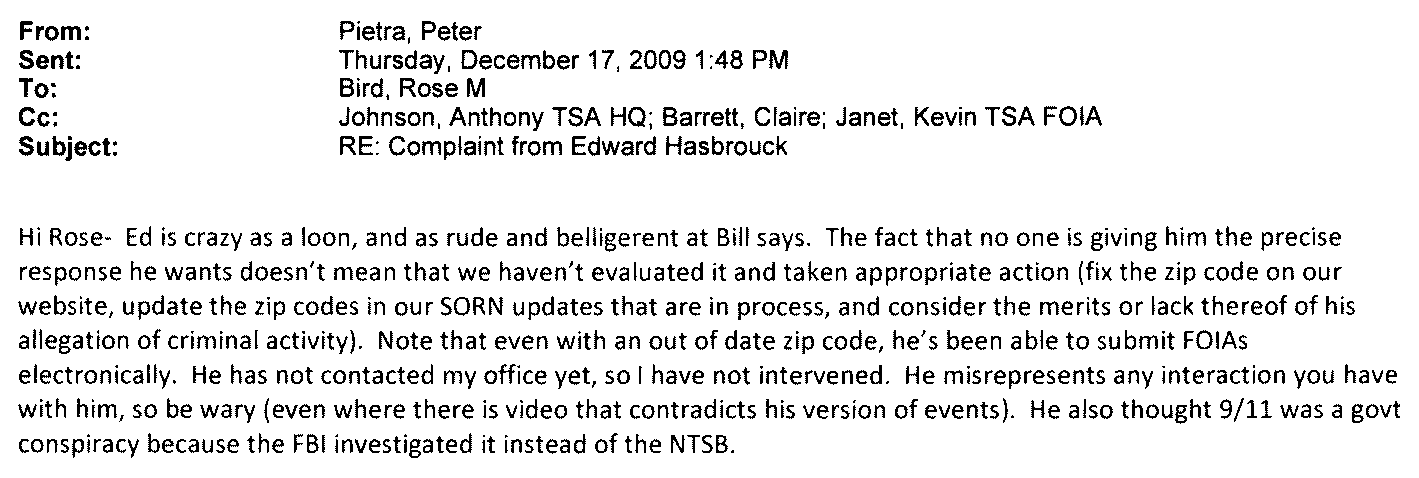9th Circuit considers Constitutionality of ban on Internet anonymity
Last year, we reported on a Federal district court hearing on the Constitutionality of portions of the law enacted by California’s Proposition 35, which requires California residents who have been convicted of certain sex-related crimes to register with the local police, annually and within 24 hours of any addition or change, for the rest of their lives, “A list of any and all Internet identifiers established or used by the person [and] A list of any and all Internet service providers used by the person… For purposes of this chapter, (a) “Internet service provider” means a business, organization, or other entity providing a computer and communications facility directly to consumers through which a person may obtain access to the Internet…. (b) “Internet identifier” means an electronic mail address, user name, screen name, or similar identifier used for the purpose of Internet forum discussions, Internet chat room discussions, instant messaging, social networking, or similar Internet communication.”
The challenge to this portion of the law, being argued by Electronic Frontier Foundation and the ACLU of Northern California on behalf of as-yet-anonymous clients who would be subject to this registration requirement, is a crucial test of the right to anonymity on the Internet.
It’s easy to say, “This only affects sex offenders.”
But restrictions on First Amendment rights are always imposed first on the most stigmatized groups of people, whether the villians du jour are serial killers, perverts, Communists, or Jews. Once they are accepted by the public as applied to those disfavored classes, these measures can gradually be expanded until everyone has to register with the government, carry government-assigned credentials identifying them and/or their group affiliation (Star of David, pink triangle, etc.), or comply with other restrictions that have come to be accepted as merely “administrative” rules for how they can exercise their rights, and are no longer considered substantive restrictions on rights.
Judge Thelton Henderson of the U.S. District Court for the Northern District of California had issued a temporary restraining order prohibiting the state form enforcing this part of the law. Following the hearing we reported on, Judge Henderson converted that order into a preliminary injunction. Both the state of California, and the sponsors of the ballot initiative (as “intervenors” in the court case) appealed to the Circuit Court before the District Court could resolve the issue of whether to make the injunction permanent.
Today a three-judge panel of he 9th Circuit Court of Appeals heard arguments on whether to let the preliminary injunction remain in force while the District Court proceedings continue.
Today’s hearing focused on whether the provisions of Prop. 35 requiring registration of Internet service providers and “identifiers” chill the exercise of free speach and are overbroad, i.e are not “narrowly tailored” to restrict no more activity protected by the First Amendment than is necessary. (The vagueness of the terms “Internet service provider” and “Internet identifier” was raised in the briefs, but barely mentioned at argument.)
Early in the hearing, Judge Jay Bybee observed that, “We’re living in a post-Snowden world now, where we all have to wonder whether all of our communications are being monitored by the NSA.” It was an intriguing suggestion of how much judicial attitudes may have been reshaped by the actions of whistleblowers.
The law’s proponents argued that free speech would not be chilled because under the law the police would have only limited authority to make Internet identifiers public.
But Michael Risher of the ACLU pointed out that chilling effects result primarily from fear of official retaliation — such as by the police. Police don’t have to make registration information public to use it themselves against people who say things they don’t like.
“A registrant who wants to criticize the local police department in comments on a local newspaper’s website, but doesn’t want to face retaliation, will be chilled if they know that their identifier is on file with those local police…. Among the reasons for protection of anonymous speech is to protect against this sort of official retaliation.” It’s easy for the police to make life hard for a registered sex offender, Risher pointed out.
The law’s defenders had a particularly hard time justifying the breadth of the registration requirement, which they conceded applied (at least as the law is written) to screen names or accounts used to post comments on websites from the New York Times to eBay, and to people whose crimes had nothing to do with the Internet.
“If I open an account so I can sell my bicycle on Craigslist, do I have to report that?”, Judge Bybee asked.
When counsel for the intervenors tried to justify the requirement for registration of Internet identifiers (but not pseudonyms used for other sorts of communications) by claiming that “sex crimes are moving to the Internet”, Judge Mary Schroeder shot back, “So is shopping. So what?”
We’re relatively optimistic that this panel of the 9th Circuit will allow the District Court’s preliminary injunction to remain in force. But it’s still up to the District Court to make that injunction permanent.

